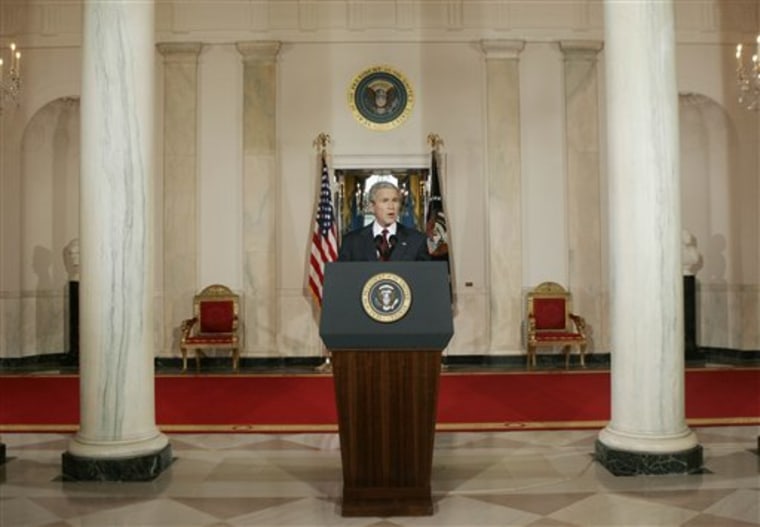President Bush, who didn't veto a bill for nearly six years, is now embracing the power to constrain the Democratic-controlled Congress even as his popularity remains low.
The strategy has blocked Congress from forcing troop drawdowns in Iraq and given Bush substantial leverage on children's health policies, federal spending and other issues.
But some say it carries a political risk. By thwarting congressional efforts to wind down the war and redirect spending to popular domestic programs, Bush could help Democrats portray Republicans as out of step with voters in the 2008 elections.
"The president's stubbornness is like an anchor around the Republican Party," said Rep. Al Wynn, D-Md.
The White House says Bush himself has issued 39 veto threats since Democrats took over the House and Senate in January. Top presidential aides have hinted at possible vetoes of several other bills.
Children's health
Bush last week renewed his pledge to veto Congress' proposed expansion of the State Children's Health Insurance Program, set to expire Sept. 30. House and Senate negotiators want to add $35 billion over five years to the program. That would insure about 4 million more children from modest-income households.
Bush says the plan is too costly and would cover families that can afford private insurance. But some congressional Republicans disagree, and see the veto threat as obstinance that could threaten their party.
"I'm very, very disappointed," said Sen. Gordon Smith, R-Ore., who faces a tough re-election fight next year.
Democrats see such veto threats as a boon to their 2008 hopes.
Bush is trying to establish that he's a fiscal conservative after overseeing a sharp rise in the deficit, said Sen. Dick Durbin, D-Ill.
"I think he has picked the wrong issues," Durbin said. "If he wants to fight over children's health insurance, I'm sorry but we're ready."
But Bush said lawmakers "are putting health coverage for poor children at risk so they can score political points in Washington." He and his aides have threatened vetoes on several other matters as well, including House representation for the District of Columbia and subsidized insurance against terrorist acts.
Overspending threats
Bush also has threatened to veto nine of the 12 appropriations bills that would fund the government for the fiscal year beginning Oct. 1.
Overrides of presidential vetoes are seldom achieved. They require a two-thirds majority vote in both chambers of Congress.
Bush first used his veto power last summer, blocking expanded federal research using embryonic stem cells. His May 1 veto of a spending bill that would have required troop withdrawals from Iraq established his ability to block any substantial Democratic effort to restructure the war.
Bush allies say his embrace of the veto became more a necessity than choice after Democrats took over Congress in the 2006 elections.
Democratic-led efforts to change policies in Iraq and elsewhere "are a direct result of losing control of the Congress," said Sen. Lindsey Graham, R-S.C., "and the only tool available to the president is to veto or threaten to veto."
Republicans "have our own base problems," added Graham, referring to conservative voters' disenchantment with Bush over large spending and deficit levels.
Republican Rep. Ray LaHood of Illinois also sees partisan motives in the veto strategy.
Government shutdown?
GOP leaders in Congress and the administration, he said, have decided "to put the veto threat out there, primarily on spending bills. We're trying to get our brand name back, which is 'fiscal conservatives.'"
Some lawmakers liken the veto showdowns to 1995, when Democratic President Bill Clinton and a GOP-controlled Congress reached an impasse over spending. It led to a partial government shutdown that angry voters blamed mostly on Congress.
Leaders of both parties say another shutdown is extremely unlikely, and Congress and the administration will somehow resolve their spending differences.
But Republicans say Bush will continue to wield veto threats for policy and political reasons, and Clinton may serve as a role model.
After huge electoral setbacks in 1994, Clinton used his veto powers "to claw his way back into relevance and re-election," said Rep. Tom Davis, R-Va. Bush will try the same tactic, but the deep unpopularity of the war may prove too high a hurdle, Davis said.
"The test is, will Bush be as effective as Clinton, or is he so badly handicapped because of the war and other limitations?" said Davis, a well-regarded GOP strategist. "We don't know."
